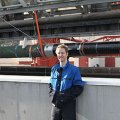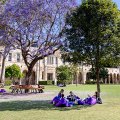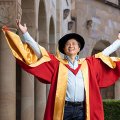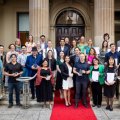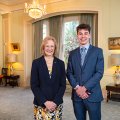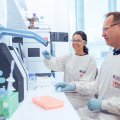The University of Queensland’s (UQ) Professor in Hypersonic Propulsion, Michael Smart, is part of an international research team, which will be honoured at the International Congress on Aeronautics in Brisbane, Australia, on September 23-28.
The Australian-US team will receive the prestigious 2012 International Council on Aeronautics (ICAS) von Karman Award for international Co-operation in Aeronautics.
They will present a paper at the conference on the Hypersonics International Flight Research Experimentation (HIFiRE) Program.
This is a series of nine experimental flights over eight years.
UQ will be involved in several of these flights, the next being HiFIRE VII scheduled to be held in 2012 at Woomera, South Australia, and which received Queensland NIRAP Smart State funding.
The von Karman award recognizes the team’s work in developing hypersonic flight technology.
It is being made for exceptional achievement in international cooperation in the field of aeronautics, and to a program characterised by substantial technical achievement, scientific or technological advance or benefit to society.
The award is presented to a team made up of a representative of each participating country, nominated by that country as a leading contributor to its part in the project or program.
Co-recipients of the award are UQ Adjunct Professor and UQ alumnus Allan Paull, who is the DSTO Research Leader in Applied Hypersonics; Mr Doug Dolvin from the United States Air Force Research Laboratory; and Dr Kevin Bowcutt from Boeing Research &Technology (USA).
Professor Smart said he was honoured to receive the award, which recognized the collaborative nature of hypersonics research being conducted in Australia and the US, with the major aim of extending knowledge about this mode of flight.
“Pioneering work in the Centre for Hypersonics at UQ in proving scramjets could work in experimental conditions and subsequently, in flight, through the HyShot program has underpinned many subsequent advances,” he said.
“This work has not only led to the development of new scramjet engines, capable of flying at eight to 10 times the speed of sound, but also other advances, such as the development of new materials capable of withstanding the extreme conditions such equipment must face.
“With the inclusion of masters, PhDs and postdoctoral fellows on research teams over the years, hypersonics programs have also helped train the next generation of aeronautical scientists.”
Professor Smart said such advancements would not be possible without the dedication and collaboration of all partners, the sharing of knowledge, and funding by agencies and government, as the cost would be prohibitive for any single group to manage.
“The HIFiRE Program is a real team effort with many young staff at UQ and DSTO playing prominent roles,” Professor Smart said.
Media: Professor Michael Smart, 07 3365 3783, m.smart@uq.edu.au
Professor Michael Smart background
Professor Smart, who graduated with a Bachelor of Engineering (Hons) at UQ in 1985 and Master of Engineering Science at UQ in 1987, was awarded a PhD at the Polytechnic University, Brooklyn, New York, in 1995.
He was appointed an Associate Professor in the Centre for Hypersonics in 2005 after spending 10 years as a research scientist at NASA's Langley Research Center in Virginia.
He is the chief investigator on the five-year National and International Research Alliances partnership collaboration between UQ, the Queensland Government, Boeing, USAF and DSTO to conduct scramjet-related flight tests as part of the HiFIRE program.
As head of UQ's HyShot Group, Professor Smart leads scramjet related research within the Centre for Hypersonics, with particular emphasis on flight applications.
Professor Allan Paull gained his PhD in applied mathematics at The University of Queensland (UQ) and subsequently obtained a MEngSc within the Dept. of Mechanical Engineering at UQ.
He has worked for 25 years in hypersonics, primarily in the field of supersonic combustion.
He is a new member of the Australian Academy of Technical Sciences. He has been employed at NASA Langley Research Center (USA), DLR (Goettingen, Germany) and GASL (NY, USA) and UQ where he held the position of an ARC Professor, an ARC Professorial Research Fellow and a UQ Research Professor.
As a research fellow he was primarily employed as an experimentalist and was a member of a team that was the first to demonstrate positive thrust of a scramjet. At UQ he was also the HyShot flight program manager, leading a team that completed four hypersonic flight tests of scramjet related experiments, one of which was the first to demonstrate supersonic combustion in flight. He was also the technical lead to HyCAUSE, a Mach 10 flight combustion experiment.
